BMW 1 Series vs Mercedes G Class – Which one offers the better deal?
Compare performance, boot capacity, efficiency and price at a glance.
Find out which car is the better choice for you – BMW 1 Series or Mercedes G Class?
Costs and Efficiency:
Price and efficiency are key factors when choosing a car – and this is often where the real differences emerge.
BMW 1 Series has a decisively advantage in terms of price – it starts at 28200 £, while the Mercedes G Class costs 106600 £. That’s a price difference of around 78390 £.
Fuel consumption also shows a difference: BMW 1 Series manages with 4.30 L and is therefore convincingly more efficient than the Mercedes G Class with 8.70 L. The difference is about 4.40 L per 100 km.
Engine and Performance:
Power, torque and acceleration are the classic benchmarks for car enthusiasts – and here, some clear differences start to show.
When it comes to engine power, the Mercedes G Class has a significantly edge – offering 605 HP compared to 300 HP. That’s roughly 305 HP more horsepower.
In acceleration from 0 to 100 km/h, the Mercedes G Class is to a small extent quicker – completing the sprint in 4.40 s, while the BMW 1 Series takes 4.90 s. That’s about 0.50 s faster.
In terms of top speed, the BMW 1 Series performs slightly better – reaching 250 km/h, while the Mercedes G Class tops out at 220 km/h. The difference is around 30 km/h.
There’s also a difference in torque: Mercedes G Class pulls significantly stronger with 1164 Nm compared to 400 Nm. That’s about 764 Nm difference.
Space and Everyday Use:
Cabin size, boot volume and payload all play a role in everyday practicality. Here, comfort and flexibility make the difference.
Both vehicles offer seating for 5 people.
In curb weight, BMW 1 Series is decisively lighter – 1465 kg compared to 2485 kg. The difference is around 1020 kg.
In terms of boot space, the Mercedes G Class offers clearly more room – 640 L compared to 380 L. That’s a difference of about 260 L.
In maximum load capacity, the Mercedes G Class performs convincingly better – up to 2010 L, which is about 810 L more than the BMW 1 Series.
When it comes to payload, Mercedes G Class evident takes the win – 715 kg compared to 510 kg. That’s a difference of about 205 kg.
Who comes out on top?
Overall, the BMW 1 Series shows itself to be shows small but notable strengths and secures the title of DriveDuel Champion.
It convinces with the more balanced overall package and proves to be the more versatile choice for everyday use.
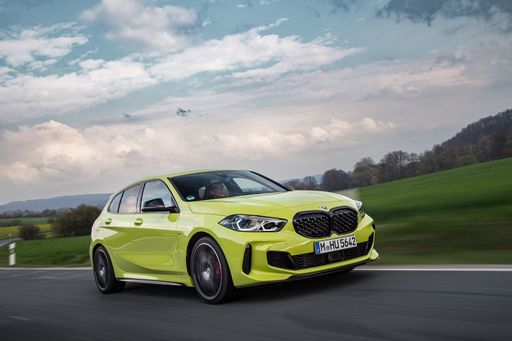
BMW 1 Series
BMW 1 Series
The BMW 1 Series stands out with its dynamic design that embodies both elegance and sportiness, making it an attractive choice for urban driving. Its interior offers a premium feel, combining quality materials with the latest in technological features to enhance comfort and connect drivers. Under the bonnet, a range of efficient engines ensures a responsive and enjoyable driving experience, balancing power with practicality.
details @ press.bmwgroup.com
@ press.bmwgroup.com
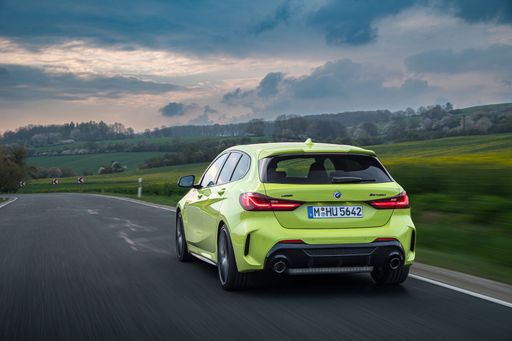 @ press.bmwgroup.com
@ press.bmwgroup.com
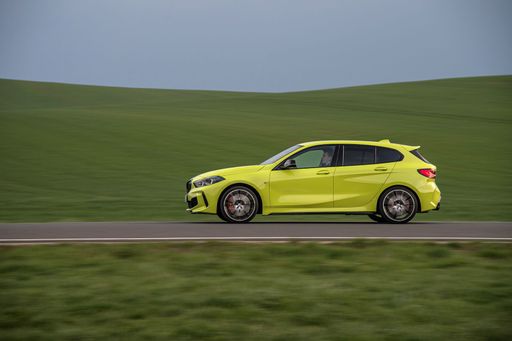 @ press.bmwgroup.com
@ press.bmwgroup.com
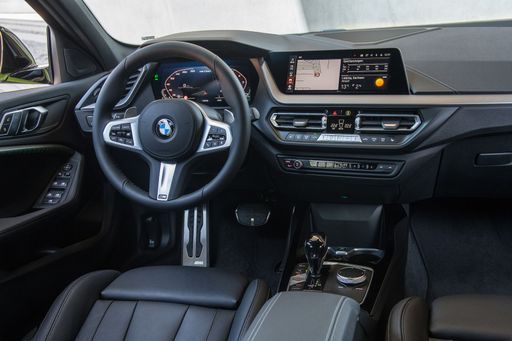 @ press.bmwgroup.com
@ press.bmwgroup.com
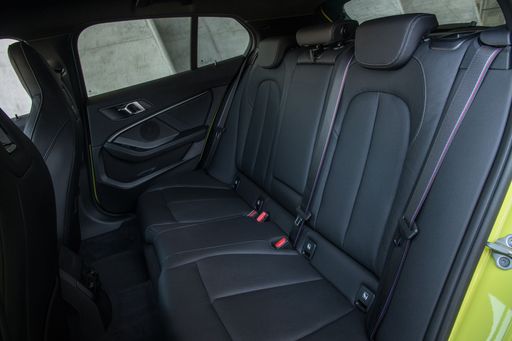 @ press.bmwgroup.com
@ press.bmwgroup.com
Mercedes G Class
The Mercedes-Benz G-Class stands as a symbol of rugged luxury, combining robust off-road capabilities with sophisticated design. Its iconic boxy shape and imposing presence are complemented by a lavish interior that offers a blend of comfort and cutting-edge technology. Despite its longstanding heritage, the G-Class continues to evolve, maintaining its status as a premier choice for those seeking both adventure and opulence.
details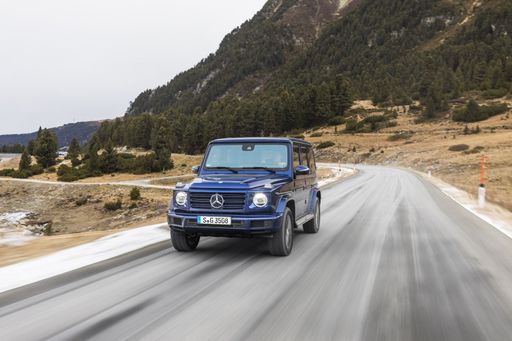 @ group-media.mercedes-benz.com
@ group-media.mercedes-benz.com
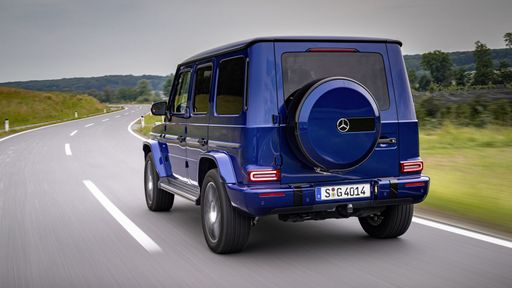 @ group-media.mercedes-benz.com
@ group-media.mercedes-benz.com
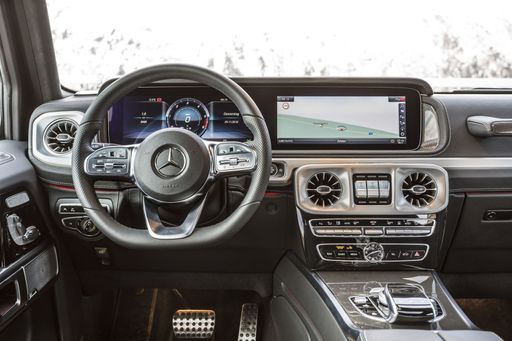 @ group-media.mercedes-benz.com
@ group-media.mercedes-benz.com

|

|
|
|
|
Costs and Consumption |
|
|---|---|
|
Price
28200 - 51100 £
|
Price
106600 - 171000 £
|
|
Consumption L/100km
4.3 - 7.6 L
|
Consumption L/100km
8.7 - 14.7 L
|
|
Consumption kWh/100km
-
|
Consumption kWh/100km
28 kWh
|
|
Electric Range
-
|
Electric Range
468 km
|
|
Battery Capacity
-
|
Battery Capacity
116 kWh
|
|
co2
112 - 173 g/km
|
co2
0 - 336 g/km
|
|
Fuel tank capacity
49 L
|
Fuel tank capacity
100 L
|
Dimensions and Body |
|
|---|---|
|
Body Type
Hatchback
|
Body Type
Off-Roader
|
|
Seats
5
|
Seats
5
|
|
Doors
5
|
Doors
5
|
|
Curb weight
1465 - 1625 kg
|
Curb weight
2485 - 3085 kg
|
|
Trunk capacity
300 - 380 L
|
Trunk capacity
620 - 640 L
|
|
Length
4361 mm
|
Length
4624 - 4873 mm
|
|
Width
1800 mm
|
Width
1931 - 1984 mm
|
|
Height
1459 mm
|
Height
1973 - 1983 mm
|
|
Max trunk capacity
1135 - 1200 L
|
Max trunk capacity
1990 - 2010 L
|
|
Payload
475 - 510 kg
|
Payload
415 - 715 kg
|
Engine and Performance |
|
|---|---|
|
Engine Type
Diesel, Petrol MHEV, Diesel MHEV, Petrol
|
Engine Type
Electric, Petrol MHEV, Diesel MHEV
|
|
Transmission
Automatic
|
Transmission
Automatic
|
|
Transmission Detail
Dual-Clutch Automatic
|
Transmission Detail
Reduction Gearbox, Automatic Gearbox
|
|
Drive Type
Front-Wheel Drive, All-Wheel Drive
|
Drive Type
All-Wheel Drive
|
|
Power HP
122 - 300 HP
|
Power HP
387 - 605 HP
|
|
Acceleration 0-100km/h
4.9 - 9.8 s
|
Acceleration 0-100km/h
4.4 - 5.8 s
|
|
Max Speed
210 - 250 km/h
|
Max Speed
180 - 220 km/h
|
|
Torque
230 - 400 Nm
|
Torque
760 - 1164 Nm
|
|
Number of Cylinders
3 - 4
|
Number of Cylinders
6 - 8
|
|
Power kW
90 - 221 kW
|
Power kW
285 - 445 kW
|
|
Engine capacity
1499 - 1998 cm3
|
Engine capacity
2989 - 3982 cm3
|
General |
|
|---|---|
|
Model Year
2024
|
Model Year
2024 - 2025
|
|
CO2 Efficiency Class
D, C, F
|
CO2 Efficiency Class
A, G
|
|
Brand
BMW
|
Brand
Mercedes-Benz
|
What drive types are available for the BMW 1 Series?
The BMW 1 Series is offered with Front-Wheel Drive or All-Wheel Drive.
The prices and data displayed are estimates based on German list prices and may vary by country. This information is not legally binding.
